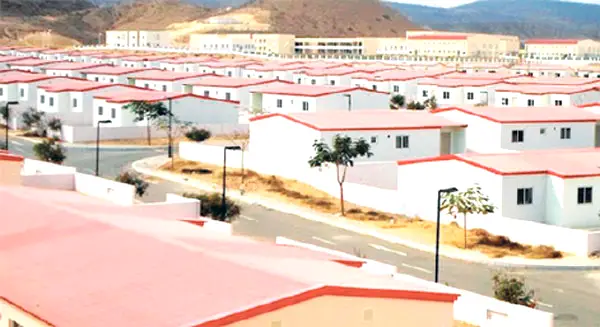Amidst the face of the current rising cost of construction materials which is attributable to the ongoing invasion of Ukraine by Russia, leading to rising energy and logistics costs globally as well as further exacerbating the global economy which was just recovering from the disruptions created by the COVID 19 pandemic, the Nigerian Institute of Quantity Surveyors NIQS, has advocated adoption of indigenous architecture, building materials and technology for housing, while incentives should be provided for the manufacture of requite building materials which raw materials abound largely across the country.
The President of NIQS, Olayemi Shonubi, who disclosed this at the Quarterly Interactive Forum organised by Property & Environment Writers’ Association of Nigeria PEWAN, weekend, said the rising cost of construction has far-reaching implications for the provision of affordable housing as fewer houses can be provided within the resources available to the government, pointing out that there is need to marshal out plans to cushion the effects.
Shonubi who was a guest at PEWAN forum, noted that “Adopting indigenous architecture and materials as well as technology for construction in the country, while providing incentives for the manufacture of requisite materials which raw materials abound largely all over the country, will address housing provision in Nigeria.
“It is only government that can engage in social housing. However, there are so many demands on the resources available to the government from infrastructure development to demands from educational institutions and health. I believe that the coming on stream of the Family Homes Funds and National Mortgage Refinancing Company NMRC, should help to cushion the housing crisis in releasing much needed credit as well as funds for housing development”.
On whether the government and the private sector are meeting the expected best practices in Public Procurement, the president of cost experts said “On the surface, one is tempted to say yes given the existence of BPP Act, which governs procurement in the public sector. But in reality, given the reports from the Project Tracking exercises organised by the ICPC in conjunction with our Institute, the NIQS and some CSOs, our public funded projects are still enmeshed in corruption.
“In a situation where MDAs undertake projects outside their areas of operation leaves room for a lot of underhand deals aside from further increasing the administrative costs of running such projects. The private sector situation, where no law binds the award and execution of contracts other than the basic corporate governance code, is more abysmal.
“However, because the spotlight is usually on the public sector, the tendency is to believe that corruption exists only in the public sector. There is the need for all procurements for constituency projects to be warehoused under a specific MDA for effectively monitoring and supervision”, Shonubi stated.
Highlighting the position of NIQS on the recently signed Executive Order on National Infrastructure and Building Maintenance, he said “We support the Executive Order 11 as it is called and believe that it is long overdue in coming as it will not only create job opportunities for the unemployed artisans who will be engaged in the maintenance of these assets of government but will also ensure that the value of these assets appreciates over their lifetime unlike what hitherto obtained.
“There are many linkages that are likely to result from this initiative. For instance, our paint manufacturers are most likely to attract more patronage, so also other building component manufacturers. The maintenance of government assets will further demonstrate the conscious efforts by the government towards meeting some of the sustainable development goals enunciated by the United Nations.
On incessant building collapse and how to curb the menace, Shonubi noted that “The spate of collapsed buildings under construction in recent time, with the attendant loss of lives, properties, investment, income/livelihood, is a sad development that calls to question the credibility and integrity of the entire construction process from application for planning approvals/building permits to monitoring of the actual constructions to ensure that they conform to the approvals given up to the issuance of Certificate of Fitness for Habitation.
“There is therefore the need for the state government to strengthen her policies for obtaining planning approvals/building permits as well enforcement of the various policies enacted in the past to ensure adequate monitoring of the actual construction to prevent further occurrences. “The government at all levels need to strengthen the laws that govern the construction process and should include provisions for severe penalties, not only fines, for everyone involved in any collapsed building project from approval level to execution level. “Endemic corruption at all levels has blinded most from adherence to professionalism and so much so that they don’t care to sacrifice money for human life. We have gotten to a stage where professional blacklisting as punitive measure alone is not sufficient no longer address the issue as erring professionals can always get some else doing to make a living.
“But when an erring professional is made to face life imprisonment or death sentence, l reckon that this will help to bring sanity as well curb these untoward developments”.
Speaking earlier, Chairman of PEWAN, Okwy Iroegbu-Chikezie noted that since the approval of the Executive Order 11 by the Federal Executive Council, the federal government has consciously started the implementation of maintenance of strategic facilities like the Federal Secretariat Abuja, and Federal Secretariats in 24 states of the federation, where at least 40 people are now daily employed in each of those 24 facilities.
According to Okwy, the office of the Head of Civil Service of the Federation has approved the establishment of a department of federal public assets maintenance as a vital step in support of the implementation of this national policy, which is unprecedented in our history and approach to maintenance.

